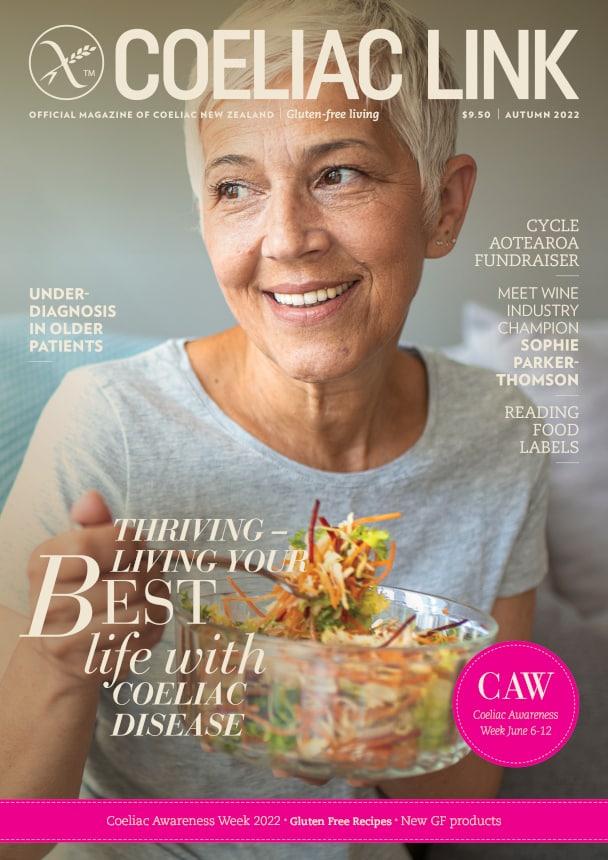

Coeliac disease is an autoimmune condition that is triggered by gluten. The gluten’s antigens induce an immune reaction against the small intestinal mucosal lining. This reaction is known as inflammation leading to several symptoms including fatigue, abdominal pain, anaemia, diarrhoea or constipation and bloating. Gluten damage is not confined to the small intestine as there is a range of extraintestinal presentations like neurological disorders in particular peripheral neuropathy, unexplained headache, and skin and joint-related symptoms reported in some patients. Ataxia and neuropathy are two essential neurologic complications of untreated CD which can particularly be problematic in elderly patients1. Cognitive impairment, like accelerated dementia, has also been seen in older patients with CD, although its effect is controversial, a gluten-free diet should be introduced, as early as possible, because of its potential protective effect. The other associated autoimmune diseases include type 1 diabetes mostly in younger patients and autoimmune thyroid disorders (Hashimoto thyroiditis and Graves’ disease) more frequently in older patients. Since, in the elderly, autoimmune thyroid disorders are more common when they are affected with coeliac disease, screening for thyroid diseases is strongly recommended in these patients. Another important manifestation of coeliac disease is osteopenia or osteoporosis which may affect older people more often. A low bone density can be associated with unexpected fractures and bone pain. For instance, lack of calcium and vitamin D are consequences of malnutrition and bone pain might be the only presentation of CD as this condition may present with atypical symptoms or no symptoms in some cases. Due to the complexity and atypical presentation, many patients remain undiagnosed, and the lack of treatment exposes these patients to complications unfortunately. For instance, malignancy is another long-term complication that is increased in untreated elderly with coeliac disease. Atypical presentation is the main reason why some patients are not being diagnosed with CD or there is a major delay between the onset of symptoms and the timing of diagnosis. The current guidelines strongly recommend treating all patients with a gluten-free diet disregard of their age or whether they are symptomatic or not. The main reason for this policy is the fact that untreated CD are at high risk for developing complications like above mentioned autoimmune disorders and malignancy. The estimated prevalence of coeliac disease in New Zealand is now about 1% in the general population with many cases remaining undiagnosed2.
The challenges are not confined to only underdiagnosis but also the management of this condition, especially in older patients. One of the challenges is changing a lifetime of dietary habits. In addition, some elderly may also have limited financial or social resources and limited mobility that restricts their ability to walk or travel to gluten-free suppliers3. Providing a gluten-free diet might be difficult for Elderly patients residing in assisted living facilities. Acknowledging the challenges would hopefully alert health professionals on how they can provide the best care of older people with coeliac disease. Additional issues that require consideration may relate to poor nutritional intake and impaired vision limiting their ability to read the labels which are often minute in size3. Patients should be encouraged to seek out community support and family members should be engaged and participate in the patient’s dietary consultation3. Direct communication between the dietitian and the food services at the patient’s organisation, if institutionalized, is likely necessary to optimise a safe and uncontaminated gluten-free diet. In the very elderly or debilitated patients who have minor symptoms, consideration of not treating the patient with a gluten-free diet may have some rationale 3-4. However, it should be noted that patients can often have a dramatic improvement in chronic symptoms, after starting a gluten-free diet, and the opportunity for possible recovery should not be overlooked.
The article was written by Adele Rostami, and Dr Kamran Rostami (a member of the Coeliac NZ Medical Advisory Panel), and was published in Coeliac Link Autumn 2022.
1 Digestive Health Clinic, Palmerston North, 2 Department of Gastroenterology, MidCentral DHB, Palmerston North
References